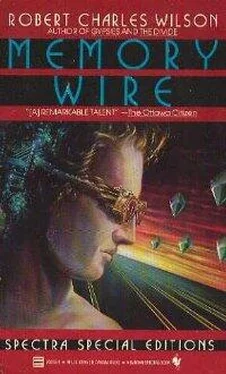Robert Wilson - Memory Wire
Здесь есть возможность читать онлайн «Robert Wilson - Memory Wire» весь текст электронной книги совершенно бесплатно (целиком полную версию без сокращений). В некоторых случаях можно слушать аудио, скачать через торрент в формате fb2 и присутствует краткое содержание. Год выпуска: 1987, ISBN: 1987, Издательство: Bantam Spectra, Жанр: Фантастика и фэнтези, на английском языке. Описание произведения, (предисловие) а так же отзывы посетителей доступны на портале библиотеки ЛибКат.
- Название:Memory Wire
- Автор:
- Издательство:Bantam Spectra
- Жанр:
- Год:1987
- ISBN:978-0-553-26853-9
- Рейтинг книги:4 / 5. Голосов: 1
-
Избранное:Добавить в избранное
- Отзывы:
-
Ваша оценка:
- 80
- 1
- 2
- 3
- 4
- 5
Memory Wire: краткое содержание, описание и аннотация
Предлагаем к чтению аннотацию, описание, краткое содержание или предисловие (зависит от того, что написал сам автор книги «Memory Wire»). Если вы не нашли необходимую информацию о книге — напишите в комментариях, мы постараемся отыскать её.
Memory Wire — читать онлайн бесплатно полную книгу (весь текст) целиком
Ниже представлен текст книги, разбитый по страницам. Система сохранения места последней прочитанной страницы, позволяет с удобством читать онлайн бесплатно книгу «Memory Wire», без необходимости каждый раз заново искать на чём Вы остановились. Поставьте закладку, и сможете в любой момент перейти на страницу, на которой закончили чтение.
Интервал:
Закладка:
The stone inside was an nth generation copy, dark with contaminants; the angles were muted, the colors pale. It could not have been worth much more than Keller had paid for the privilege of touching it. Still…
So close now, Teresa thought.
She took the oneirolith in her hand.
It was always the same for her, this sense of an opening up, a clambering out of the shell of her body. With her eyes closed she felt suspended in an indefinite space. The room had fallen away on every side; her body felt numb and distant.
The phenomenon was mysterious; copious research had shed no real light. The current theory, Teresa understood, was that the oneiroliths acted somehow directly on the mind—the ghost in the crystal touching the ghost in her own architecture of blood and tissue. Maybe the Exotics had used the stones this way; maybe the visions they created were some skewed diffraction of that function, the human mind laboring over inhuman code.
It hardly mattered. What mattered were these persistent half dreams, the delicate blue-winged people in their impossible plenitude… their deserts and forests and farms and cities… and the human scenarios, too, almost as strange, a parade of ancestors. She felt their potency even through the medium of this crudely copied stone. Giddy with it, she reached for Keller’s hand.
He pulled back.
“It’s all right,” she whispered, the sound of her own voice vague and distant. “It’s just … I would like not to be alone.” And opened her eyes a moment to see him.
Slowly, he nodded. Watching her—his eyes on hers with the intense scrutiny of a frightened animal—he reached his big hand across the table.
The contact was electric.
Old, powerful memories.
She saw Keller in Cuiaba a decade ago.
Keller the draftee. Keller riding in on a mottled green military transport from Rio. Keller and a couple of other recruits dispersed to a combat unit in this dusty meat town, dazed, an Army-issue thread-rifle slung over one shoulder and his duffel over the other.
His face was indistinct—an image glimpsed and ignored in mirrors—but cruelly young. He was stick thin, clean-shaven, made naive by a childhood in the simmering conduit suburbs. “The blessed innocence of failed comprehension”—Meg had said that.
Megan Lindsey was one of the women in his platoon. A Pfc like Keller, but she had some combat experience; she had been on patrol down the dangerous corridor of BR-364. “California-born,” Byron said, “like you. Doesn’t talk much. Attitude problem, some people say. I think she’s just scared—and scared to show it.”
Byron Ostler was the platoon Angel. Keller was fascinated by him, this white-haired gnome drafted out of an industrial-chemistry course at some midwestern agricultural campus, a year younger than Keller. Byron showed him the scar at the back of his neck. “Angel scar,” he said. “Look for it.” He regarded Keller through his protective lenses. “You should stay away from me, you know. If you run with the freaks, you are a freak. Plus, who knows what might get downloaded?” He flashed his tattoo. “The eyes of the Personnel Branch are upon you.”
“They look at all these recordings?”
“Combat mainly. Running them in realtime is what you might call problematic. But you never know.”
It didn’t bother Keller. He was fascinated by Byron, and more fascinated by Meg. He maneuvered himself next to her in the mess hall, talked to her a little. She seemed grateful for the attention. Her family ran a bacteria farm up in the San Fernando Valley ; she had been burned brown walking the enclosures every summer since she was ten, reading out fermentation gauges into a pocket recorder. She was lithe and small and her face was mobile, but Keller thought Byron was probably right: there was fear there, too, not far below the surface.
He watched her move in esoteric katas on the parade ground one tropical noon. Sheened with sweat, she achieved grace. Her khaki T-shirt dangled limply from her shoulders; the huge pockets of the fatigue pants blossomed at her hips. Her hair, cut into a military pageboy, gave back the vertical sunlight. Keller had never seen anything like her. He watched from the shade of a storage shed, letting the memory burn into him, admitting for the first time that he might have fallen in love with her. She moved like a scythe, and did not seem to see him until, moments later, sitting zazen in the damp heat, storm clouds rising up behind her from the Mato Grosso a horizon away, she looked at him… locked eyes with him, shocked him with a smile.
Because the compound at Cuiaba was overcrowded, Keller slept in a tent staked out between the halide lights and the barbed perimeter fence. She came from the women’s bunker after lights-out that night, whispering his name in the dark, and although they had not planned it, neither was he surprised: the promise had been in her look. They made love inexpertly but passionately, traded childhood reminiscences in the hours before reveille.
When he asked her about her patrols out BR-364, she sat up abruptly, shivering in the dark. “You’ll find out soon enough.”
He apologized for asking. She ran her fingers through the stubble on his scalp. “Out there, Ray,” she said, “it’s easy to do things you’re not proud of.”
The platoon went out a couple of days later. A troop carrier dropped them off in the ragged farm country southeast of Ti Parana. Keller walked point some. Byron went into an Angel fugue, not talking much, looking intensely, gliding—Keller thought—above the deep currents of his fear. Meg walked with a white-knuckled grip on her thread-rifle. The tension was high—there had been guerilla activity all through these pockmarked farm villages—but they did not actually see action until they stumbled into an ambush in a muddy manioc field somewhere in Rondonia. The noise was sudden and astounding. The sky lit up with the antiseptic glare, of burning phosphorus. Keller heard the bang and whistle of cluster bombs on every side of him; without thinking, he went to his knees. The blood—
“No,” he said, and pulled back his hand. Teresa opened her eyes, shaken. Keller was staring grimly back. Some of this had seeped through to him, she thought, powerful images leaping the gap between them. His own memories. “I’m sorry,” she said hoarsely. She opened her hand and left the oneirolith on the table. The old Brazilian woman scuttled over with her tin box. “ Passou a hora.” Their time was up.
It left her depressed. They walked back to the hotel in the aftermath of the rain, a sour humidity rising from the streets. Down the mouth of an alley Teresa glimpsed a posseiro woman, in transit or homeless, squatting among her possessions and suckling a naked child. The child had a thatch of dark hair, big eyes, Indio features. The woman cradled the child’s head in the crook of her arm and gazed down at him with an expression of unselfconscious affection that made Teresa turn away, suddenly weak. After what Keller had said about Byron, after what she had seen, she felt chastised. We are all down here hunting some grail, she thought, digging for it, scrabbling after it, not out of greed but out of our misplaced sincerity… and here was this illiterate woman crouched in an alley, certainly poor and probably homeless, but whole where they were broken (she felt it like a cold wind through her), healthy where they were crippled. It made her feel small; it made her feel ashamed.
The hotel lobby was full of stale warmth. In the room, Ng was waiting.
CHAPTER 7
When he was certain the Americans had left Brasilia, Stephen Oberg boarded a SUDAM flight directly to Pau Seco.
He had simply to flash his Agency card. SUDAM and the Brazilian government generally had been eager to cooperate. Technically—according to his documents—Oberg was a civilian employee of the DEA, but since the great amalgamation of the federal agencies in the thirties, the distinction had become obscure—his immediate superior was an NSA bureaucrat on lease to the security branch, and he was answerable to the Embassy.
Читать дальшеИнтервал:
Закладка:
Похожие книги на «Memory Wire»
Представляем Вашему вниманию похожие книги на «Memory Wire» списком для выбора. Мы отобрали схожую по названию и смыслу литературу в надежде предоставить читателям больше вариантов отыскать новые, интересные, ещё непрочитанные произведения.
Обсуждение, отзывы о книге «Memory Wire» и просто собственные мнения читателей. Оставьте ваши комментарии, напишите, что Вы думаете о произведении, его смысле или главных героях. Укажите что конкретно понравилось, а что нет, и почему Вы так считаете.












